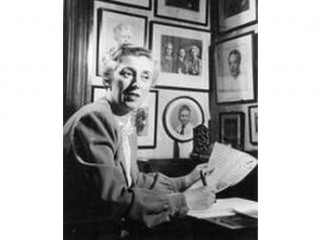
Ellen Fairclough biography
Date of birth : 1905-01-28
Date of death : 2004-11-13
Birthplace : Hamilton, Ontario, Canada
Nationality : Canadian
Category : Politics
Last modified : 2011-03-23
Credited as : Politician, Cabinet minister, Conservatives
Ellen Louks Fairclough was Canada's first female Cabinet minister. Preferring example to preaching in advancing women's rights, she was her country's outstanding example of a woman successful as wife, mother, businesswoman, and public servant.
Born in Hamilton, Ontario, on Jan. 28, 1905, Ellen Louks was the daughter of Norman Ellsworth Cook and Nellie Bell Louks. She was educated in Hamilton public and secondary schools, graduating at the age of 16. After a brief stint as a stenographer, she became an accountant. In 1931 she married D. H. Gordon Fairclough, owner and operator of a printing company.
Fairclough's interest in politics dated from the time she and her husband helped organize the Young Conservative Association of Hamilton. In 1935 she started her own accounting firm and continued to operate it until becoming a member of the government in 1957. After World War II she decided to seek municipal office. She was defeated in her first attempt for the office of alderman of Hamilton. However, when the sitting alderman resigned within a few months, she was elected to fill the vacant post, in which she served from 1946 to 1949. In 1950 she served as municipal controller and deputy mayor.
In 1949 in the general election Fairclough won the nomination as the Progressive Conservative candidate for a seat in the House of Commons from the constituency of Hamilton West, but she failed to unseat the incumbent. When he resigned, she won his seat in a by-election in 1950.
As the new member of the opposition party, Fairclough soon made her mark as an informed and constructive critic of the government. Representing a riding, or electoral district, in a large urban industrial city, she had a compelling interest in labor matters. In the fall of 1950, she served as a member of Canada's delegation to the United Nations. In 1951 she was named chairman of the Labour Committee of the Opposition caucus and chief spokesperson of her party on labor matters.
Fairclough's efforts in the House of Commons, however, were not confined to one area. She had fought from her earliest political days for equal pay for equal work for women and was delighted when the St. Laurent administration enshrined the principle in federal legislation. She was never a strident feminist but deplored the waste of womanly talents in business and public affairs. She knew that the traditionally conservative attitude of men, and particularly of women themselves, militated against full participation.
In 1953 and in 1957 she was reelected to Parliament. The latter was the election that brought John Diefenbaker to office as prime minister. He had promised, if elected, to name a woman to his Cabinet, and Fairclough was named Canada's first female Cabinet minister as secretary of state. In the landslide government victory of 1958 she was reelected and was named to a new post as minister of citizenship and immigration, in which position she also had responsibility for Indian affairs. In the general election of 1962 she held her seat, and shortly after, she became postmaster general of the new Diefenbaker government.
In 1963 Fairclough met defeat in the election that turned out the Progressive Conservative administration. After leaving politics, she returned to Hamilton and private business. She first occupied a senior executive position with a trust company, moving from that job to the chairmanship of Hamilton Hydro. Before her retirement, she served as treasurer of the Zonta International women's group.
She has been the recipient of a number of honors during her political career and also during her retirement years in Hamilton. The Canadian Blackfoot Tribe and the Six Nations Indian Band Council have recognized her efforts on the behalf of native Canadian peoples. The Canadian Council of Christians and Jews awarded her its Human Relations Award. The former Cabinet member received the Coronation Award in 1963, the Centennial Award in 1967, and the Jubilee Medal in 1977. In 1985, Fairclough was invested Dame of Grace in the Order of St. John of Jerusalem, Knights Hospitaler. Among her honors, perhaps the most gratifying was her investment in 1992 with the title "The Right Honorable" in the presence of Queen Elizabeth II. In the fall of 1996, she received the Order of Ontario, the highest honor awarded by the province of her birth.
Political Career of Ellen Fairclough:
* Ellen Fairclough was elected to Hamilton City Council in 1946. She served on the Hamilton City Council for five years until 1949.
* Ellen Fairclough was first elected to the House of Commons in a by-election in 1950. She was the only woman in the House of Commons until three others were elected in the 1953 general election.
* As Progressive Conservative labour critic, Ellen Fairclough introduced a private member's bill requiring equal pay for equal work and advocated the creation of a Department of Labour Women's Bureau.
* With the election of a Conservative minority government in 1957, John Diefenbaker grudgingly appointed Ellen Fairclough to cabinet as Secretary of State. As Secretary of State, Ellen Fairclough initiated Dominion Day celebrations on Parliament Hill.
* The Conservatives won a majority government in 1958, and Ellen Fairclough was appointed Minister of Citizenship and Immigration. At the beginning of her time at Citizenship and Immigration, Ellen Fairclough ran into political problems, especially from the Italian community, when she tried to limit immigration family sponsorships to immediate family members, and was forced to back down. In 1962 however, Ellen Fairclough successfully brought in regulations which went a long way towards the elimination of racial discrimination in Canadian immigration policy.
* She was moved to the Postmaster General portfolio in 1962.
* Ellen Fairclough was defeated in the 1963 election.
















